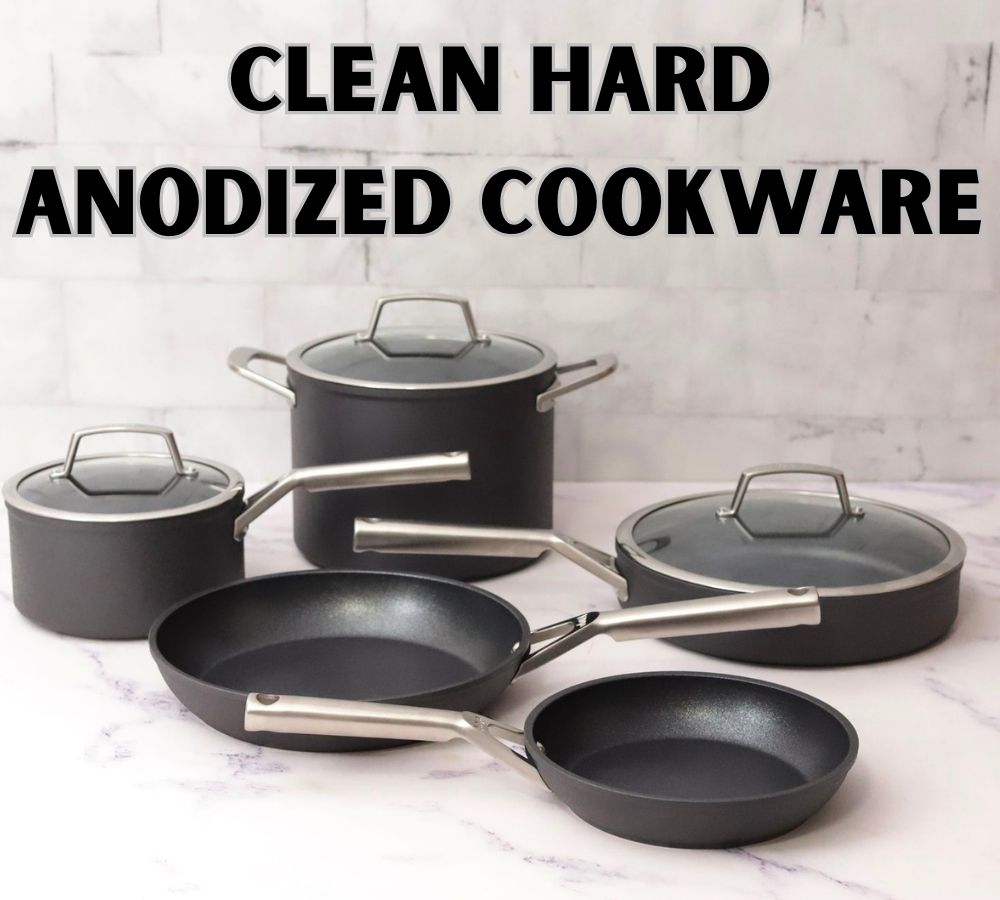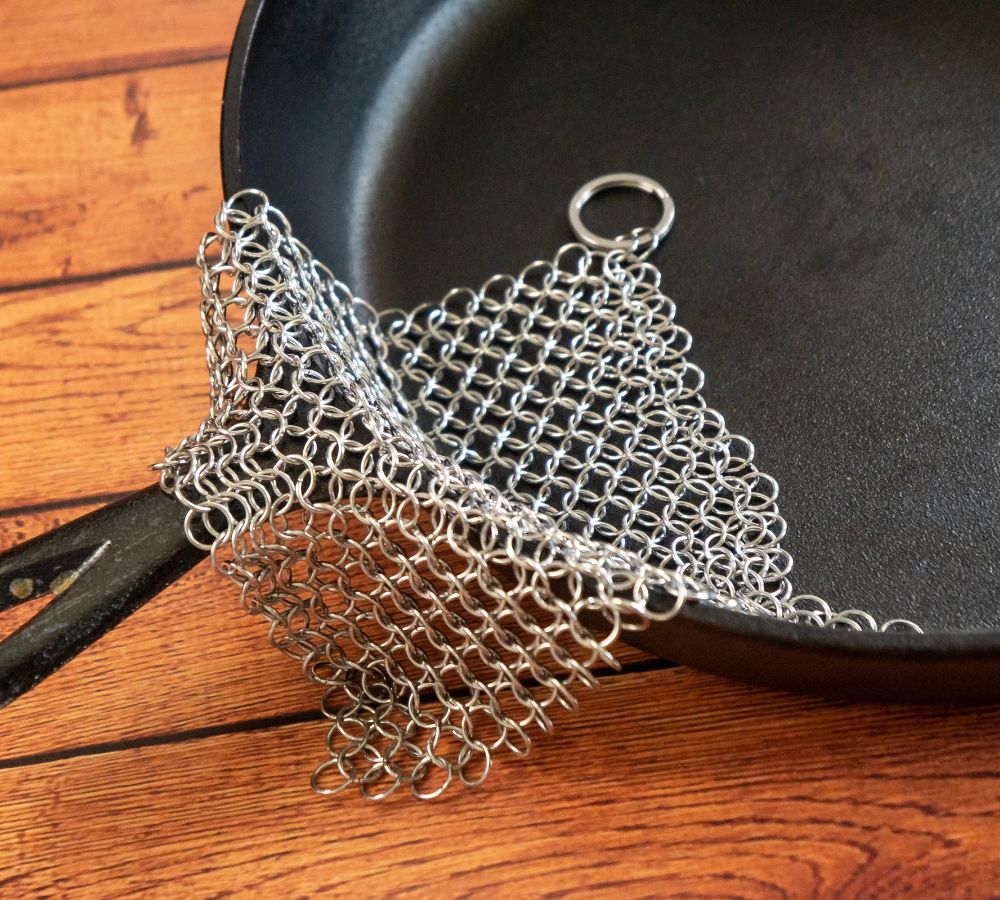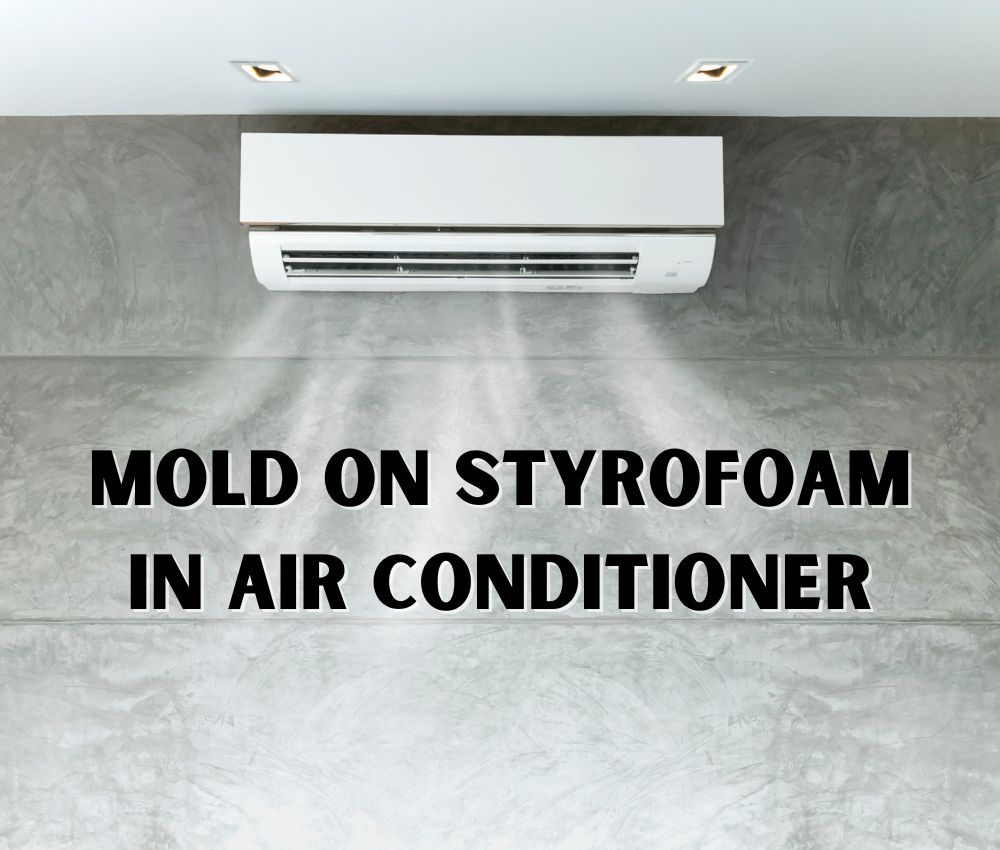Effortless Ways to Clean Hard Anodized Cookware at Home

Clean Hard Anodized Cookware. Do you ever find yourself struggling to clean your hard anodized cookware? With the proper techniques, it can be effortless to maintain the cleanliness and longevity of your cookware. In this section, we’ll explore the best way to clean hard anodized cookware in the comfort of your own home and provide you with simple and effective methods.
Whether you’re dealing with a burnt-on mess or want to clean your cookware thoroughly, these tips will help you achieve sparkling results with minimal effort. Say goodbye to scrubbing for hours or worrying about damaging your cookware. Follow our guide to discover the hassle-free way to clean your hard anodized cookware.
Make sure cleaning your cookware is manageable. With these tips, you can keep your cookware looking new for years. Let’s start with the proper techniques to ensure your hard anodized cookware is always in its prime condition.
Table of Contents
Understanding Hard Anodized Cookware

Hard anodized cookware is a specialized type of cooking utensil subjected to an electrochemical process. This method increases its toughness and longevity beyond that of ordinary aluminum cookware and generates a non-reactive surface that prevents food from sticking and facilitates effortless cleaning.
However, the surface of hard anodized cookware is also more susceptible to damage if not properly maintained. The surface can be scratched by metal utensils and abrasive cleaners, which can cause the non-stick surface to wear off over time.
Therefore, proper maintenance of hard anodized cookware is essential to ensure its longevity and performance. Here are some tips to help you care for your hard anodized cookware:
- Use only non-metallic utensils, such as silicone, nylon, or wooden, to avoid scratching the surface.
- Avoid using abrasive cleaners and harsh chemicals, such as bleach and oven cleaners, which can damage the surface.
- Hand-wash your hard anodized cookware with warm, soapy water and a soft sponge or cloth. Avoid using steel wool or other abrasive materials.
- Avoid placing your hard anodized cookware in the dishwasher, as it can lead to surface damage caused by the use of harsh detergents and high heat.
- Store your hard anodized cookware carefully to avoid scratches and dents. Use soft padding or towels between pots and pans to prevent them from rubbing against each other.
Before diving into the cleaning process, it’s essential to understand what hard anodized cookware is and why it requires specific care. Learn about the benefits of this type of cookware and how to prolong its life through proper maintenance.
Preparing Your Hard Anodized Cookware for Cleaning
Before you begin the cleaning process, properly preparing your hard anodized cookware is essential. Taking the time to prepare your cookware ensures the cleaning process is as effective as possible and prevents any damage to the surface.
Here are some essential tips to follow:
- Allow the cookware to cool down completely before cleaning.
- Remove any food residue or debris with a soft brush or cloth.
- Do not use abrasive sponges or steel wool pads, which can scratch the surface.
- Use a non-abrasive cleaner specifically designed for hard anodized cookware if there are any stubborn stains.
These simple steps will ensure your hard anodized cookware is ready for safe and effective cleaning.
Safe and Gentle Cleaning Solutions for Hard Anodized Cookware

When cleaning hard anodized cookware, it’s important to use safe and gentle solutions that won’t damage the surface or leave behind any residue. Here are some effective cleaning solutions to try:
Vinegar:
Combine an even amount of water and white vinegar in a spray bottle. Spritz the mixture onto the cookware and rest for a few minutes. Cleanse using a gentle sponge or cloth.
Baking Soda:
Make a mixture of water and baking soda to form a paste. Smear the paste onto the cookware and leave it for a few minutes. Employ a soft sponge or cloth to scrub gently, followed by rinsing with water.
Lemon Juice:
Create a solution by blending water and lemon juice in equal proportions within a spray bottle. Spritz the mixture onto the cookware, leaving it to rest for several minutes. Employ a gentle sponge or cloth to wipe away any residue, followed by rinsing with water.
These natural ingredients can effectively remove tough stains and grime without causing any harm. However, avoid using harsh chemicals or abrasive materials like steel wool, scouring pads, or hard-bristled brushes, as they can scratch the cookware’s surface.
Additional Tips:
- For extra stubborn stains, try boiling water and vinegar in the cookware for a few minutes before cleaning.
- Always clean your hard anodized cookware with warm, soapy water after each use to maintain its appearance and performance.
- It is advisable to avoid placing your hard anodized cookware in the dishwasher, as the strong detergents and high temperatures can cause harm to its surface.
Using safe and gentle cleaning solutions and following proper maintenance practices ensures your hard anodized cookware stays in excellent condition for years.
Easy Steps to Deep Clean Hard Anodized Cookware
Deep cleaning your hard anodized cookware is essential to keep its performance and appearance intact. Here are some easy steps to follow:
- Prepare the Cookware: Before starting the deep cleaning process, clean the cookware with warm water and soap to remove any loose debris or food particles. This will ensure the cleaning solution can penetrate the cookware’s surface.
- Create a Cleaning Solution: Mix equal parts water and distilled white vinegar in a large bowl or basin for a deep cleaning solution. You can also add a few drops of mild dish soap if needed.
- Apply the Solution: Immerse your cooking utensils into the cleansing mixture and leave them steep for under half an hour. Apply the solution to the affected spots using a soft cloth or sponge.
- Scrub the Cookware: Use a non-abrasive scrubbing pad or brush to scrub the cookware gently after soaking. Be sure to pay attention to any stubborn stains or buildup.
- Rinse and Dry: Once thoroughly scrubbing the cookware, rinse it with warm water and dry it using a soft cloth or towel.
- Polish the Cookware: To restore the shine of your hard anodized cookware, apply a small amount of coconut or olive oil to the surface and buff it with a soft cloth.
Following these easy steps will help you achieve a deep clean of your hard anodized cookware, eliminating any lingering residue and restoring its shine.
Additional Tips:
- Always use non-abrasive cleaning tools, such as soft sponges or cloths, to avoid scratching the cookware’s surface.
- Avoid harsh chemicals or abrasive cleaners that can damage the hard anodized finish.
- Do not stack your hard anodized cookware without placing protective padding or towels in between to avoid scratches.
- Store your cookware in a cool and dry place to prevent any moisture buildup that could lead to corrosion or rust.
By following these additional tips, you can even further prolong the life of your hard anodized cookware.
Removing Stains from Hard Anodized Cookware
Stains can be a frustrating problem with hard anodized cookware, but don’t worry. Effective solutions are available to restore your cookware’s original beauty. Here are some tips for removing stains:
- Use a baking soda paste: Create a dense paste by mixing baking soda with water. Apply this mixture to the stained areas, leaving it undisturbed for a few hours. Delicately scrub the affected surfaces using a gentle sponge or cloth before finally rinsing off with warm water.
- Vinegar and water solution: Create a mixture of white vinegar and water. Apply the solution to the stained areas and let sit for a few minutes. Scrub gently with a soft sponge or cloth and rinse with warm water.
- Use lemon juice: Cut a lemon in half and rub the stained areas with the cut side. Let sit for a few minutes, then rinse with warm water.
When cleaning hard anodized cookware, avoiding harsh abrasives and chemical cleaners is crucial. These can harm the surface, so it’s best to opt for natural cleaning solutions suitable for this cookware. By adhering to these guidelines, you can successfully eliminate stains and discoloration from your hard anodized cookware, ensuring its pristine appearance remains intact for many years.
Tips for Daily Cleaning and Maintenance of Hard Anodized Cookware

Keeping your hard anodized cookware clean and well-maintained is essential to ensure longevity. Here are some easy cleaning methods and tips to incorporate into your daily routine:
- Hand washing: Always wash your hard anodized cookware in warm, soapy water, and avoid using abrasive sponges or steel wool. These can scratch the surface and remove the non-stick coating.
- Avoid high heat: Do not use high heat with hard anodized cookware, as it can cause warping or damage to the surface. Use low to medium heat settings, and avoid exposing the cookware to temperatures over 500°F (260°C).
- Proper storage: Store your hard anodized cookware properly, preferably with pan protectors or in a dedicated cabinet to avoid scratches and damage.
- Avoid acidic ingredients: Avoid cooking acidic ingredients in hard anodized cookware, such as tomatoes or citrus fruits, as they can damage the non-stick surface.
- Use gentle cleaners: Use gentle cleaners, such as baking soda or vinegar, for daily cleaning. These cleaners are effective in removing stains and grease without causing any harm to the cookware.
- Dry thoroughly: Dry your hard anodized cookware thoroughly after each use to prevent water spots or rust. Also, avoid stacking the cookware when it’s wet.
Avoiding Common Mistakes when Cleaning Hard Anodized Cookware
Cleaning hard anodized cookware can be a breeze with the proper techniques, but it’s essential to avoid common mistakes that can damage the surface. Here are some safe cleaning techniques for hard anodized cookware that you should keep in mind:
- Avoid abrasive tools: Hard anodized cookware has a non-stick surface that can get scratched by abrasive tools like steel wool or metal brushes. Instead, use soft sponges, dishcloths, or non-scratch scrubbers to clean the cookware.
- Avoid extreme temperatures: Hard anodized cookware exhibits excellent heat resistance but is susceptible to warping or cracking when exposed to abrupt temperature changes. To avoid such issues, it is recommended not to place hot cookware in cold water or vice versa.
- Avoid acidic or alkaline cleaners: Hard anodized cookware can react to acidic or alkaline cleaners, causing discoloration or damage to the surface. Use mild, non-toxic cleaners specifically designed for hard anodized cookware.
- Avoid cooking spray: Cooking spray can leave a residue on the cookware’s surface that’s difficult to remove and can cause food to stick. Instead, coat the surface with a small amount of oil or butter.
- Avoid stacking cookware: Stacking cookware can cause scratches or dents on the surface. Use separators or towels to cushion the cookware when stacking.
By avoiding these common mistakes, you can ensure that your hard anodized cookware remains in great condition for years. Always use safe cleaning techniques for hard anodized cookware to maintain its performance and appearance.
Additional Tips for Caring for Hard Anodized Cookware
Ensure your hard anodized cookware stays in top condition for many years; following proper maintenance practices is essential. Here are some additional tips:
- Use the right utensils: Avoid using metal when cooking with hard anodized cookware, as they may scratch or damage the surface. Instead, opt for silicone, nylon, or wooden utensils that won’t scratch the coating.
- Store properly: When storing your hard anodized cookware, avoid stacking or nesting it with other pots and pans, as this can damage the coating. Instead, use protective pads or cloth to separate the cookware and prevent scratches.
- Avoid high heat: While hard anodized cookware is designed to withstand high temperatures, it’s best to avoid overheating it. Use low to medium heat settings on your stove to prevent damage to the cookware.
- Use the right cleaning tools: Opt for non-abrasive sponges or brushes when cleaning your hard anodized cookware. Avoid steel wool or abrasive cleaners, which can scratch or damage the surface.
- Avoid dishwasher: While some hard anodized cookware is dishwasher safe, it’s best to avoid exposing it to harsh chemicals and high temperatures in the dishwasher. Instead, hand wash your cookware with gentle cleaning solutions.
Conclusion
As you have learned, hard anodized cookware requires specific care to maintain its appearance and performance. With these effortless cleaning techniques, you can easily clean and care for your cookware in the comfort of your home. Always prepare your cookware before cleaning, use safe and gentle cleaning solutions, and avoid common mistakes that can damage the surface.


